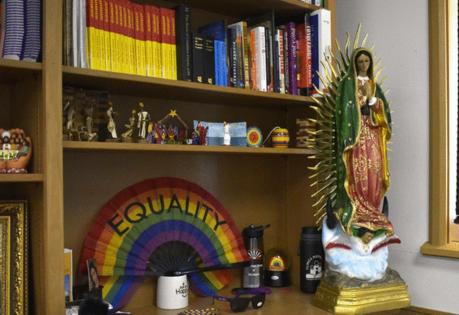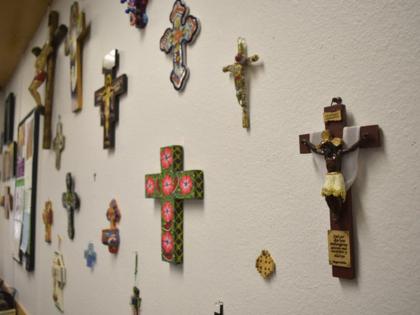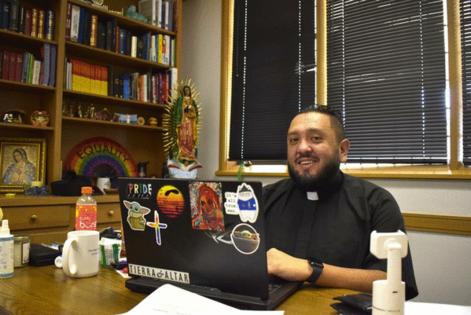'You are not an error.' How an Episcopal church reaches LGBTQ+ farmworkers
Published in Religious News
FRESNO, Calif. — Workplace bullying, religious trauma, complicated relationships with their own communities.
These are some of the challenges that LGBTQ+ farmworkers face, said Rev. Nelson Serrano Poveda, the Latino/Hispanic missioner at Fresno’s St. James Episcopal Cathedral. Many come from small, socially conservative towns in Latin America, and Poveda said some of those who are LGBTQ+ have been rejected by families that use religious arguments to turn away their children: “ ‘You are going to hell because you are a homosexual.’ “
“My first job when I speak to them is to say, ‘You are not an error,’ “ Poveda told The Fresno Bee. “ ‘God made you the way you are, and He loves you.’ “
Hearing that for the first time, he said, can change someone’s life.
Academic research has not yet produced any data on the number of LGBTQ+ people in the farmworking community, but Poveda, like others who perform outreach in the fields, knows from experience that they exist — often with social and cultural struggles that compound problems farmworkers are more commonly known to deal with, including inadequate access to immigration services and healthcare.
“Because farmworkers tend to live in more isolated rural communities, there may be fewer LGBTQIA+ support services available,” says a 2022 report from the National LGBTQIA+ Health Center and a Washington D.C.-based organization called Farmworker Justice.LGBTQIA+ stands for lesbian, gay, bisexual, transgender, queer, intersex and asexual, and the plus sign signifies that there may be more identities not yet covered in the acronym.
St. James Episcopal, a church within the Episcopal Diocese of San Joaquin, has been doing outreach to farmworkers in the Central Valley for several years. The Episcopal church is known for its acceptance of LGBTQ+ people as they are, and it has taken its progressive stance to the fields.
Poveda said Fresno’s Episcopal church has worked with more than 10 LGBTQ+ farmworkers since 2020. The church helps them deal with coming out to their families and connects them to organizations that provide other social, healthcare and immigration services. LGBTQ+ farmworkers, Poveda said, often don’t identify themselves in the moment, but eventually reach out to the church privately or are referred to it by others.
One of the church’s LGBTQ+ parishioners, Jose Vallejo, 30, said he has experienced the difficulties of coming out to family. He also said he has experienced workplace abuses and injustices, including sexual harassment, while working in a Fresno-area citrus and almond nursery. Those experiences led him to attain a documented immigration status through the Deferred Action for Labor Enforcement (DALE) program, which provides temporary work authorization to immigrants who report labor code violations.
Vallejo, like many of his fellow Spanish-language parishioners at St. James, was raised Catholic. He was first invited to St. James by his aunt, and has found a home there.
“This church, they don’t tell you, ‘Are you gay? Oh, you’re not welcome here,’ “ Vallejo said. “Everyone is welcome here.”
How the church reached LGBTQ+ farmworkers
It could be said that the Episcopal church’s relationship with LGBTQ+ farmworkers in the Central Valley began with a bike ride in 2015.
Bishop David Rice, head of the Episcopal Diocese of San Joaquin, had organized a 750-mile ride — from the southwest corner of Kern County all the way up to Modesto — to raise awareness about human trafficking and funds to work against the crime. That ride showed the Episcopal church some of the stark realities undocumented farmworkers face in the Central Valley.
In 2019, the diocese organized the “Pilgrimage of Hope,” a 173-mile trek from Fresno to Sacramento to raise awareness for immigrants’ rights. Poveda was living in his native of country of Colombia at the time, and was invited to California to interpret information and prayer in the fields into Spanish during the pilgrimage. The pilgrimage led the church to launch its outreach efforts for farmworkers in the fields.
The following year, Poveda relocated to Fresno permanently to administer that outreach. He said church members would carry pamphlets with them that included information about the Episcopal Church’s stance on LGBTQ+ issues. The pamphlets were ignored — until one day they weren’t.
“One young man kept looking and looking,” Poveda said. “He didn’t take the pamphlet, but he did take my phone number.”
The young farmworker, who Poveda said was an immigrant from the Mexican state of Oaxaca, later called the reverend. Poveda said the young man told him being gay was not approved of in his hometown, so he left in search of work and a more accepting place to live.
But in the Central Valley’s agricultural fields, the young man encountered bullying through verbal abuse, Poveda said. As time went on, he disappeared, and Poveda lost contact with him.
“But that opened the door for us to be more attentive, to bring publications about our church’s welcome to the LGBTQ+ population with us in our outreach,” Poveda said.
Recognizing traditions, culture
A large painting of Nuestra Señora de Guadalupe — the Mexican apparition of the Virgin Mary — is an immediate eye-catcher in the chapel at Fresno’s St. James Episcopal Cathedral.
The Virgen de Guadalupe is an important, familiar visual for the Spanish-speaking parishioners who fill the chapel for mass each Sunday, many of whom were raised Catholic, said Poveda.
“Our LGBTQ+ farmworkers, they feel that this is what they know because in their hometowns — in Mexico, Central America and South America — the hegemonic church is the Catholic church,” he said. “So when they come to the Episcopal church, they recognize it ... they recognize the prayers and identify with them.”
The Episcopal church, which has roots in the Church of England, shares some similarities with Catholicism: The reverends are priests, they pray the “Our Father,” they believe in the Virgin Mary’s importance as Christ’s mother.
In 2018, the General Convention of the Episcopal church approved liturgies for the Virgen de Guadalupe, Day of the Dead and Las Posadas, a popular Latin American Christmas-time celebration in honor of Mary’s and Joseph’s journey to find refuge for the birth of Jesus.
“You see everyone here, they all think differently,” Vallejo, the LGBTQ+ parishioner, said of his fellow church members. “Just because we are all members of the same church, it doesn’t mean we are all the same ... everyone creates their own church within their hearts.”
____
This reporting is supported by the Latino Media Collaborative, a non-profit news media organization that creates and fosters transformative media as well as everyday news for the Latino community. Visit www.latinomedia.org to learn more.
©2024 The Fresno Bee. Visit at fresnobee.com. Distributed by Tribune Content Agency, LLC.














Comments